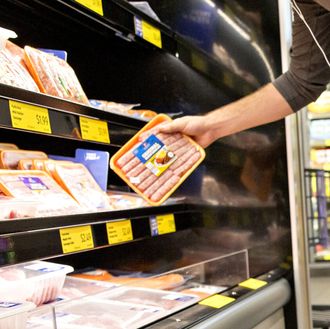
For a guy who likes eating fast food because it’s “very clean,” President Trump sure is blasé about making America’s food safer. (With so many important executive matters to tend to, he can’t find time?) After just nine months of controlling policy, he’s already gotten angry letters from almost every influential watchdog group — the Center for Science in the Public Interest, the Center for Food Safety, the Center for Foodborne Illness Research & Prevention, Food & Water Watch, STOP Foodborne Illness, Food Policy Action, and even the nonprofit that publishes Consumer Reports.
The latest controversy? Politico reported yesterday on a “little-noticed” plan by Trump’s USDA to shift international food safety from an office where oversight makes sense (the Food Safety and Inspection Service) to a brand-new undersecretary post where it arguably does not. Ted McKinney, the guy who was given this post, which involves foreign trade, is the former head of a giant animal-drug company called Elanco, and effectively knows squat about international food safety. Critics don’t trust Big Pharma hack with America’s involvement in a joint U.N.-WHO food-safety panel known as the Codex Alimentarius Commission. A fight’s currently underway over whether to ban a cattle-feed additive called zilpaterol that Tyson refuses to use, and the European Union, China, and other countries insist is unsafe for humans. Unsurprisingly, McKinney has much more positive feelings about the drug, and food-safety officials from both the Obama and Bush administrations worry what will happen if he’s put in charge of the “food code.”
But, again, this is merely the latest example of experts getting alarmed at ways the president’s administration is chipping away at food safety. Here’s a quick primer on six others:
1. During the campaign, Trump very briefly threatened to eliminate what he called the “FDA Food Police” (capitals in the original). No one took the vow seriously, including staff — who’d scrubbed it from DonaldJTrump.com hours after it went live. But either way, the White House’s 2018 budget would still slash the FDA’s funding for food safety by $117 million, ostensibly to rein in “burdensome regulations” that are a “source of stagnation” in the economy. Also proposed: defunding entire swaths of the CDC that exist solely to ensure that food is healthy.
2. Two words: “Sonny” “Perdue.” Trump’s Agriculture secretary is a fan of factory farms, used to sell fertilizer, doesn’t believe in anthropogenic climate change, and believes his main job is to “roll back regulations” enacted by his predecessor. He’s also the Georgia governor under whose watch America’s biggest, worst-ever food recall occurred — bad peanuts in 2008 that killed nine people and tainted over 3,900 different products in 46 states.
3. Chlorpyrifos is a pesticide routinely sprayed on strawberries, broccoli, and apples. It’s linked to brain damage in kids, among other things; use on tomatoes was banned in 2002. Obama’s EPA suggested outlawing it entirely, but Trump’s crew has changed the federal government’s mind (20 days after EPA Administrator Scott Pruitt met with the pesticide’s manufacturer, but that’s probably random coincidence).
4. Meanwhile, students are getting poorer nutrition under Trump with or without a potentially brain-damaging pesticide. Perdue put an official moratorium on several of Michelle Obama’s key school-lunch policies, like a plan that reduced the sodium content allowed each year. He argues that kids throw the former First Lady’s meals away because they lack “palatability.” Solution: more heavily processed bread, and chocolate milk with more fat.
5. In August, Justice Department attorneys joined restaurant trade groups that want to dismantle New York City’s calorie-label law, suddenly taking the FDA’s side this time by arguing only that agency can decide “when and in what circumstances” menu labels are enforced.
6. Immediately after this, the USDA’s own inspector general lit into the Agricultural Marketing Service because the office, which is responsible for ensuring that organic imports are compliant, let millions of pounds of fake “organics” pass through U.S. ports.




